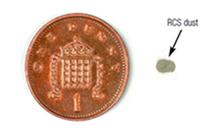Silicosis Can Kill.
DON’T GAMBLE WITH YOUR FUTURE HEALTH AND HAPPINESS BY TAKING RISKS AT WORK TODAY
WHAT IS SILICA?
Silica is a natural substance found in varying amounts in most rocks, sand and clay. These common construction materials may contain large amounts of respirable crystalline silica (RCS), which can be fatal if breathed in over time.
Some of the most common construction jobs create high RCS dust levels. These jobs often involve the use of power tools like cut-off saws, grinders, breakers and sanders. Cutting kerbs, flags, bricks, tiles and concrete produces silica particles in the airborne dust which are too small to be seen. Regularly breathing in this dust over a long time can cause irreversible, life-changing lung diseases.

Even breathing in small amounts of silica dust (RCS), as shown here, puts you at risk of developing lung disease.
WHAT COULD HAPPEN TO ME?
Exposure to RCS dust can cause serious health problems and may eventually kill you. By breathing it in, you could develop the following lung diseases:
- Silicosis: Silicosis makes breathing more difficult and increases the risk of lung infections. Silicosis usually follows exposure of RCS dust over many years, but extremely high exposures can lead rapidly to ill health.
- Chronic obstructive pulmonary disease (COPD): COPD is a group of lung diseases, including bronchitis and emphysema, resulting in severe breathlessness, prolonged coughing and chronic disability.
- Lung cancer: Heavy and prolonged exposure to RCS dust can cause lung cancer.
These serious, often life threatening, lung diseases can be avoided if exposure to RCS dust is adequately controlled.
HOW TO STAY SAFE
Control exposure to RCS dust to stay safe. There is a legal duty for employers to prevent, or adequately control, worker exposure to RCS dust. Ideally, your employer will eliminate your risk of exposure to dust by good design and planning. Where this is not entirely possible, measures should be put in place by your employer to control dust and you should wear an appropriate respirator.
Below you can find the basics about how to control exposure to RCS dust. Further information can be found here:
USE ON-TOOL EXTRACTION WHEN USING POWER TOOLS
On-tool extraction is an effective control for dust and will reduce your risk of ill health. On-tool extraction is a type of local exhaust ventilation (LEV) system which is fitted directly onto the tool.
Further information about on tool extraction can be found here: Controlling construction dust with on-tool extraction CIS69 (hse.gov.uk)
PROTECT YOUR HEALTH WHEN USING CUT-OFF SAWS
Cut-off saws (variously known as disc cutters, skill saws, Stihl saws, con saws or ‘whizzers’) are widely used in the construction industry. Manage the risk of breathing in RCS dust when using this equipment by:
- Damping down the dust – water suppression is your first line of defence
- Wearing a suitable respirator and ensuring you have a face-fit test for a tight-fitting respirator. You need to be clean shaven for this tight fit type of respirator to work effectively
- Check your machinery and safety equipment regularly
- Ensure equipment is regularly maintained.
Further information about reducing exposure to RCS dust when using this equipment can be found here: Using cut-off saws: A guide to protecting your lungs INDG461 (hse.gov.uk)
WHAT NOT TO DO!
Avoid dry sweeping construction waste, sweeping will create airborne dust particles that can be breathed in. Instead you should use a vacuum or wet cleaning to control exposure to RCS
Do not use compressed air for removing dust from clothing.
TALK TO YOUR EMPLOYER ABOUT THE RISKS
Ask your employer about the measures in place to protect you from exposure to RCS dust on a small, medium or large building site. Remember, your employer has a legal responsibility to keep you safe and protect your health.
Talk to your employer today about the risks, and how to avoid them. Make sure you understand how a job should be done safely without creating risks to your health.
Terry, a former stoneworker suffering with silicosis
HSE’s Professor David Fishwick interviews Terry who suffers from silicosis after being exposed to respirable crystalline silica (RCS) at work.



